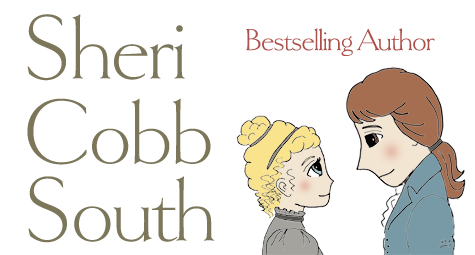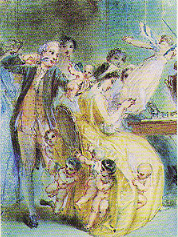Since many of my readers are history/literature buffs, I thought you might like to read it as well. You may share it if you wish, as long as you give me (and Pope!) author credit, as below.
by Sheri Cobb South
(with apologies to Alexander Pope)
Since Pope did on the fair Belinda dwell,
And offered not the Baron’s side to tell,
I here allow the Rapist equal chance
To speak his case and plead his own defense.
“My lady, he begins, “I must object,
My character and honor here protect.
It seems to me appropriate to claim
That I a victim more than villain am.”
“A victim? You?” outraged Belinda cries,
“You ought to blush with shame to tell such lies!
Behold, where once two sable locks were worn,
My neck, now bare: both of its ringlets shorn.
The first was cut by your deceitful hand;
Its twin, alas, cut at my own command.
Now, having seen my poor, ravaged locks,
Can you deny your guilt, oh cunning fox?”
“I don’t deny,” said he. “I must confess
‘Twas my own hand that stole the shining tress.
But, fair nymph, if malice here there be,
‘Twas but to avenge that which you stole from me.”
“What stole I e’er from you?” the nymph shot back,
“Save but a game of cards of red and black?”
With forcefulness that made Belinda start,
The Baron cried, “Fair maid, you stole my heart!
Come, my lady, come, let us be fair:
You have my heart, so why not I your hair?
Yet now I find (though much to my disgrace)
A thousand locks cannot one heart replace.
Though I the lock have claimed, my heart’s yours still,
And though hairs grow again, hearts never will.”
The Baron wooed Belinda with such charms,
At last she smiled, and laid aside her arms.
“Dear sir,” she said, “if you had asked of me,
I might have given the lock most willingly.”
“Alas, ’tis now too late,” the Baron said,
“But might I hope to have your hand instead?”
Belinda offers him her fingertips;
The grateful Baron lifts them to his lips.
For thus it is with lovers the world around:
For each thing lost, a better thing is found.
If one should lose, they never lose alone;
But when one wins, then both the vict’ry own.”



